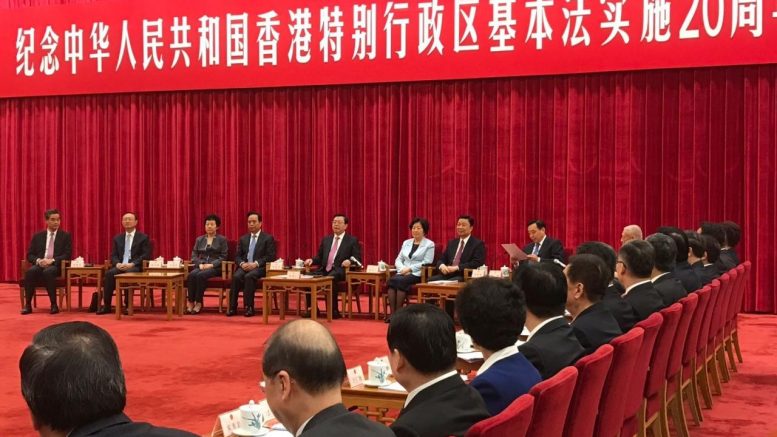By Chris Yeung –
It was billed as a symposium aimed to commemorate the 20th anniversary of the implementation of the Basic Law. But coming just about one month before the 20th anniversary of the July 1 changeover, the event held at the Great Hall of the People on Saturday was anything but a discussion.
Attended by a team of top Beijing officials involved with Hong Kong affairs and a group top Hong Kong officials led by Chief Executive Leung Chun-ying and a bunch of elites Beijing most trusted, the symposium featured a 50-minute address by Zhang Dejiang, China’s top official in charge of Hong Kong policy on Beijing’s latest policy statement on Hong Kong.
Zhang, the Number Three at the ruling Communist Party’s Politburo and chairman of the National People’s Congress, laid down Beijing’s plan to tighten its grip on Hong Kong affairs.
He has also set out a list of key tasks for the new administration led by Carrie Lam Cheng Yuet-ngor. They include the enactment of a law on national security, which was shelved indefinitely after the July 1 rally in 2003.
In his speech, Zhang has urged the Hong Kong Government to fulfil their constitutional obligation to enact a law to safeguard national security to curb acts that endanger national unification. Though without naming Basic Law Article 23, it is the clearest signal from Beijing for an early enactment of the anti-subversion law.
Zhang’s reminder of a resumption of Article 23 legislation is one of the set of detailed tasks he set out on Beijing’s agenda for Hong Kong. They are aimed to restore what Beijing deems as the proper balance between the principle of upholding “one country” and the promise of keeping Hong Kong’s system intact in the “one country, two systems” constitutional framework.
Based on the overriding principle that Beijing holds “comprehensive powers of governance” over Hong Kong, he reiterated that the relationship between the central government and SAR government is not a case of power-sharing, but delegation of powers.
Under no circumstances, he said, that Hong Kong is allowed to “confront” the exercise of powers by the central government “in the name of high degree of autonomy.”
Zhang has specifically named activities that advocated “power of self-autonomy, and even self-determination and Hong Kong independence” as acts that were aimed to deny Beijing’s powers over Hong Kong.
“(This is something that) absolutely cannot be ignored,” said.
Call for enactment of Article 23
While it remains to be seen whether the Carrie Lam administration would dust off the Article 23 legislative work, Zhang has made clear Beijing would formulate in detail the list of powers of the central authorities over Hong Kong. Beijing would also detail an operational mechanism of the implementation of the Basic Law.
On his list of powers include the power to examine laws enacted by the SAR on whether they contravene the Basic law, the power of decision on political development of Hong Kong, the power of the central government to issue directives to the Chief Executive and the power to require the Chief Executive to report his work.
The “to-do” tasks laid down by Zhang in his speech are areas that Beijing feels adamant that they had ignored since the handover and should now be re-asserted.
They should therefore not be interpreted as attempts by Beijing to negate their promise of high degree of autonomy to Hong Kong. Beijing insisted those powers Beijing are entitled are legitimate under the “one country, two systems” policy and implicitly enshrined in the Basic Law provisions.
Doubters and cynics, however, have good reason to argue Beijing has moved to put more curbs on the autonomous powers of the SAR.
The truth is that the notions of “power to review” the legality of laws passed by the Hong Kong legislature and “power to issue directives to the Chief Executive” are not spelled out in the Basic Law. Nor they seem to have been discussed in detail during the drafting of the Basic Law, judging from publicly available information about the drafting work.
As Hong Kong’s “one country, two systems” journey is near to enters its 21st year, Beijing is anxious to serve early notices to citizens on their plans to exercise their “comprehensive powers” over the city, some of which they deem had been left unused in the past 20 years.
Those notices, however, are grim, also shock, reminders to Hong Kong people about the widening gulf between the promises made in 1997 and the realities unfolded in 2017.
Chris Yeung, Chief Writer of newly-launched CitizenNews, is founder and editor of the Voice of Hong Kong website. He is a veteran journalist formerly worked with the South China Morning Post and the Hong Kong Economic Journal. He writes on Greater China issues.
Photo: Picture taken from RTHK website


Be the first to comment on "Promises in 1997 versus realities in 2017"